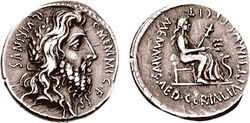
Roman coin from 55 BCE which depicts Quirinus on the obverse and Ceres on the reverse.
In Roman mythology, Quirinus was an early god of the Roman state. In Augustan Rome, Quirinus was also an epithet of Janus, as Janus Quirinus.[1] His name is derived from Quiris meaning "spear."
History[]
Quirinus was originally most likely a Sabine god of war. The Sabines had a settlement near the eventual site of Rome,and erected an altar to Quirinus on the Collis Quirinalis, the Quirinal Hill, one of the Seven Hills of Rome. When the Romans settled there, they absorbed the cult of Quirinus into their early belief system — previous to direct Greek influence — and by the end of the first century BCE Quirinus was considered to be the deified Romulus.[2][3] He soon became an important god of the Roman state, being included in the earliest precursor of the Capitoline Triad, along with Mars (then an agriculture god) and Jupiter.[4] Varro notes the Capitolium Vetus an earlier cult sited on the Quirinal, devoted to Jupiter, Juno and Minerva,[5] among whom Martial makes a distinction between the "old Jupiter" and the "new".[6]
In later times, however, Quirinus became far less important, losing his place to the later, more widely known Capitoline Triad (Juno and Minerva took his and Mars' place). Later still, Romans began to drift away from the state belief system in favor of more personal and mystical cults (such as those of Bacchus, Cybele, and Isis). In the end, he was worshiped almost exclusively by his flamen, the Flamen Quirinalis, who remained, however, one of the patrician flamines maiores, the "greater flamens" who preceded the Pontifex Maximus in precedence.[7]
Depiction[]
In earlier Roman art, he was portrayed as a bearded man with religious and military clothing. However, he was almost never depicted in later Roman belief systems. He was also often associated with the myrtle.
Festivals[]
His festival was the Quirinalia, held on February 17.
Legacy[]
Even centuries after the fall of the Roman Empire, the Quirinal hill in Rome, originally named from the deified Romulus, was still associated with power - it was chosen as the seat of the royal house after the taking of Rome by the Savoia and later it became the residence of the Presidents of the Italian Republic.
Etymology[]
Quirinus is probably an adjective meaning "wielder of the spear" (Quiris, cf. Janus Quirinus). Other suggested etymologies are: (i) from the Sabine town Cures; (2) from curia, i.e. he was the god of the Roman state as represented by the thirty curies. A. B. Cook (Class. Rev. xviii., p. 368) explains Quirinus as the oak-god (quercus), and Quirites as the men of the oaken spear.[8]
Notes[]
- ↑ In the prayer of the fetiales quoted by Livy (I.32.10); Macrobius (Sat. I.9.15);
- ↑ Fishwich, Duncan The Imperial Cult in the Latin West Brill, 2nd edition, 1993 ISBN 978-9004071797 [1]
- ↑ Evans, Jane DeRose The Art of Persuasion University of Michigan Press 1992 ISBN:0472102826 [2]
- ↑ Inez Scott Ryberg, "Was the Capitoline Triad Etruscan or Italic?" The American Journal of Philology 52.2 (1931), pp. 145-156.
- ↑ Varro, De lingua latina V.158.
- ↑ Martial, (V, 22.4) remarks on a position on the Esquiline from which one might see hinc novum Iovem, inde veterem, "here the new Jupiter, there the old."
- ↑ Festus, 198, L: "Quirinalis, socio imperii Romani Curibus ascito Quirino".
- ↑ "Quirinus". Encyclopedia Britanica 1911. http://www.theodora.com/encyclopedia/q/quirinus.html. Retrieved 2011-04-05..
References[]
- This article incorporates text from the Encyclopædia Britannica, Eleventh Edition, a publication now in the public domain.
| This page uses content from the English Wikipedia. The original article was at Quirinus. The list of authors can be seen in the page history. |